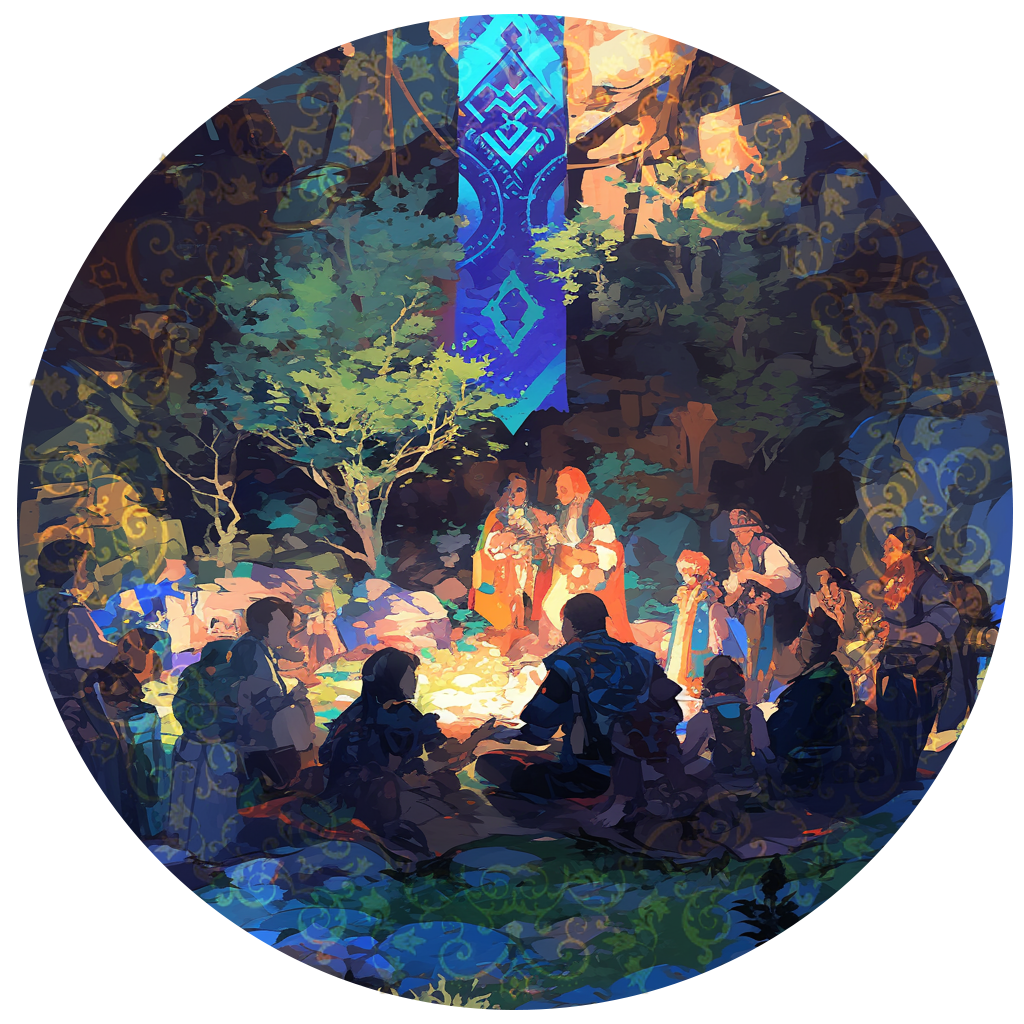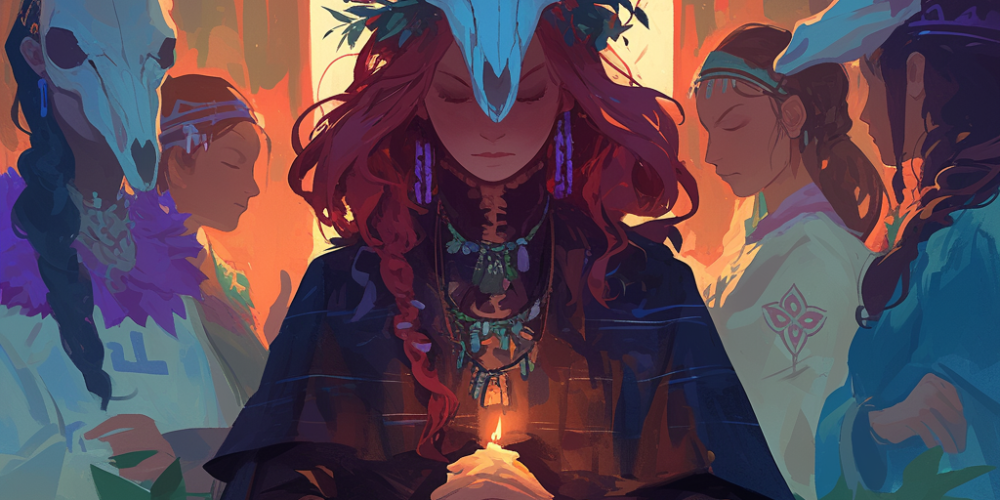What is a Closed Practice?
A closed spiritual practice is a type of spiritual path that places specific requirements or restrictions on who can engage in its rituals, teachings, and customs. Unlike open practices, which are accessible to anyone interested in learning, closed practices are closely tied to cultural, geographic, ancestral, or community-based factors. These restrictions are designed to protect the integrity, authenticity, and sacredness of the practice, ensuring that traditions are preserved and passed down by those with the right cultural background, understanding, and commitment.

Key Elements of Closed Practices
Closed practices often have criteria that cannot be met by outsiders. For instance, participation might require belonging to a particular bloodline or ancestry, being raised within a specific cultural heritage, or living within a geographical area that holds significant spiritual importance. These traditions are often deeply connected to the experiences, beliefs, and customs of a community, making it difficult for outsiders to engage authentically. Such spiritual practices are typically nuanced and deeply rooted in the culture and identity of their practitioners.
Initiation and Permission in Closed Practices
Many closed practices require permission, initiation, or mentorship before someone can partake in them. This is common in covens, houses, or closely-knit spiritual groups within Paganism and other traditions. Often, these communities practice rituals or spiritual workings that are highly specific and require a profound understanding of their principles and traditions. Permission is not just a gatekeeping mechanism; it is a way to ensure that individuals are aligned with the values, ethics, and spiritual commitments of the practice, and that they will uphold the responsibilities that come with participation.
Stewardship and Preservation

Closed practices can be dogmatic or highly structured, demanding a strong commitment from their practitioners. Rituals, beliefs, and teachings are often guarded within the community, passed down through generations to retain their original intent and power. By establishing a direct connection to the practice’s community, culture, or lineage, these traditions safeguard their sacred nature, protecting them from being misinterpreted or misused by those lacking the necessary cultural context or understanding.
It’s important to note that these boundaries exist not to exclude or alienate, but to honor and preserve the spiritual depth, cultural context, and authenticity of the practice. Acknowledging and respecting these boundaries is key to maintaining the spiritual path’s integrity and honoring the ancestral experiences and heritage of those who uphold these traditions.
Ancestral Lineage and Cultural Background in Pagan Traditions
Ancestral lineage and cultural background are central to many Pagan traditions, where spirituality is deeply intertwined with heritage. These elements are more than historical markers—they are living connections to the past that breathe life into rituals, teachings, and sacred practices, ensuring they remain relevant and vibrant within the community. Practices rooted in a person’s ancestry often reflect the experiences, values, and spiritual understandings of that culture, creating a deep bond between spiritual identity and family heritage. This inherited spirituality allows traditions to be passed down through generations, reinforcing the cultural and spiritual identity of practitioners.
Respect for lineage emphasizes that spiritual practices are not just learned; they are inherited and lived. Rituals and teachings carry unique nuances shaped by the community’s experiences, making them difficult to replicate authentically by outsiders. Practitioners are not just performing rituals; they are actively engaging with their ancestors, reaffirming the bond between past, present, and future generations, and using the practice as a way to preserve culture.
Requirements for Participation in Closed Practices
In contrast to open spiritual paths, some Pagan traditions are closed practices, meaning that participation is limited to those who meet specific criteria. These may include having a direct familial connection to the culture or tradition or adhering to a unique set of beliefs, principles, or moral codes. Such criteria are vital to ensuring that the practice is kept within the hands of those who are vested in its proper transmission, preservation, and sacredness.
Initiates seeking to participate may need to undergo rites of passage, mentorship, or formal initiation from a recognized authority, mentor, or elder within the community. This process signifies dedication and willingness to align with the spiritual, ethical, and cultural values of the tradition. A deep commitment to these principles maintains the practice’s integrity and protects it from misinterpretation or dilution. Practitioners are seen not only as followers but as stewards of the sacred lineage, tasked with upholding and passing down the practice’s teachings appropriately.
Case Study: Hoodoo
Hoodoo (or Rootwork) provides a powerful example of a closed practice deeply rooted in cultural and ancestral connections. Emerging from the history and resilience of African slaves in the United States, Hoodoo developed as a spiritual path centered on resistance, healing, and empowerment. Central to Hoodoo is the veneration and invocation of ancestors, particularly those who suffered the trauma of enslavement. The power and efficacy of Hoodoo rituals, spells, and workings are tied directly to these ancestral spirits, making a direct cultural and historical connection vital for authentic practice.

While Hoodoo might appear accessible through the use of common roots, herbs, and household items, its deeper layers require an understanding of the cultural, historical, and spiritual contexts unique to the African diaspora. Those without a personal connection to this history may not fully grasp its complexities or engage with its practices authentically. Due to its cultural significance, Hoodoo is considered a closed practice, and its rituals and teachings are best preserved within the African American community.
Engagement and Dialogue within the Pagan Community
In the larger Pagan community, fostering engagement and respectful dialogue is crucial for building mutual understanding and celebrating the variety of spiritual paths. Open discussions about beliefs, rituals, and traditions allow practitioners to share perspectives and develop a deeper appreciation for the diverse spiritual practices within Paganism. This exchange of knowledge and experiences helps individuals find common ground and explore new aspects of their spiritual paths.
Respecting the boundaries of closed practices is equally important. Understanding why certain traditions are closed to outsiders prevents cultural appropriation and spiritual misinterpretation. This respectful approach ensures that sacred traditions are honored, and the rich diversity within Paganism is celebrated rather than diminished. By promoting dialogue based on respect and mutual support, the Pagan community can uphold a commitment to each tradition’s cultural and spiritual integrity.




